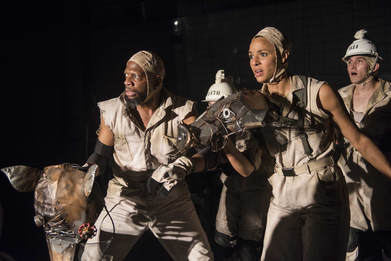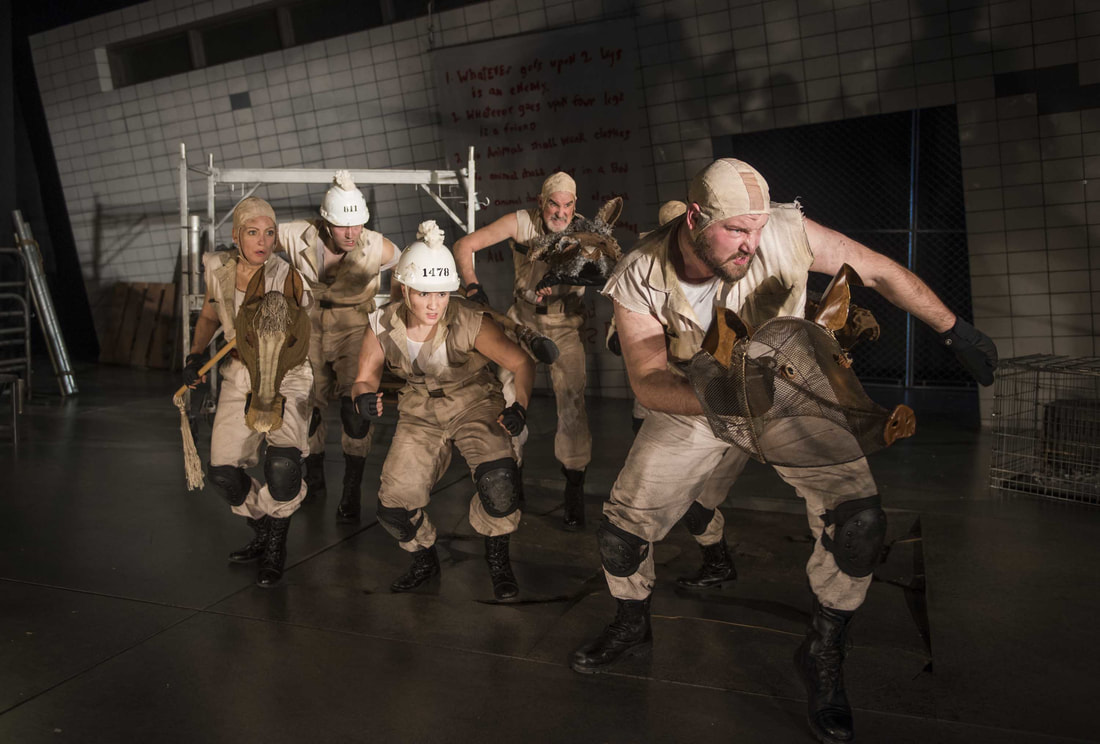 Milwaukee Repertory Theater presents Animal Farm in the Quadracci Powerhouse from January 9 through February 11, 2018. Left to Right: Melvin Abston, Tiffany Rachelle Stewart and Brade Bradshaw. Photo by Michael Brosilow. Milwaukee Repertory Theater presents Animal Farm in the Quadracci Powerhouse from January 9 through February 11, 2018. Left to Right: Melvin Abston, Tiffany Rachelle Stewart and Brade Bradshaw. Photo by Michael Brosilow. By Mary Boyle George Orwell's Animal Farm, the allegorical tale of the Bolshevic Revolution published in 1945, is enjoying a renewed popularity in our country, as of late. A leader who appeals to the concerns of the working class, only to gain power for himself, seems to resonate with many; history, as they say, has a tendency to repeat itself. Last season, the First Stage Young Company staged a splendid production of the story, and now The Rep brings Animal Farm to a larger stage at the Quadracci Powerhouse Theater. This adaptation by Ian Wooldridge, directed by May Adrales, scales down both the language and the characters in the story, and uses movement, music, and the use of puppets to fill the void. Scenic Designer, Andrew Boyce, liberates the story from its English farm, and sets it instead in a dark, dirty industrial building, complete with disturbing fluorescent lighting. Only eight actors cover over 12 characters, which Costume Designer Izumi Inaba has dressed in a ragged one-piece white coverall paired with black combat boots. Only their masks, which are rarely used to cover their faces, and a few spare props distinguish their individual characters. All this sparseness means that the actors must carry the bulk of the storytelling, which they do, and they do it well. Farmer Jones's prize pig, Old Major (Stephanie Weeks), has grown old and wise, and passes on what he's learned over his life to the other animals on Manor Farm: that all animals are equal, and no animal should ever have tyranny over or kill another animal; that their lives would be better if they were free of the rule of men, who are all evil and, once free of them, animals must never adopt their habits or vices. Old Major envisioned a time in the future when animals would rise up and overthrow men, and he taught them a special song called "Beasts of England" to remind them of their destiny. Shortly after Old Major dies, the animals have their revolution and run Farmer Jones off the farm. The pigs on the farm, Snowball (Brendan Titley), Squealer (Tiffany Rachelle Stewart), and Napoleon (Melvin Abston), quickly take the lead, since they can read and write, enforcing a set of laws based on Old Major's advice, called Animalism, and renaming the farm Animal Farm. The big draft horse, Boxer (Weeks), and his helpmate, Clover (Deborah Staples), are sure that their lives will improve, but the old donkey, Benjamin (Jonathan Gillard Daly) is skeptical, and Mollie (Stewart), the fancy carriage horse, can't quite swallow that freedom doesn't include lumps of sugar and ribbons in her hair. Rep Associate Artists and Milwaukee favorites, Jonathan Gillard Daly and Deborah Staples, remind us why they're favorites in this production. Daly plays the only two humans in the show: Farmer Jones in the beginning and Farmer Pilkington at the end, but he really shines as the perpetually grumpy but wise old donkey, Benjamin. Staples embodies the confusion and doubt that eventually becomes horror, as Clover realizes the truth about what is happening on the farm. I admit I was doubtful that a small woman could pull off the part of Boxer, but Stephanie Weeks convinced me, and Tiffany Rachelle Stewart brought much needed humor and style to both of her roles. Melvin Abston's Napoleon was slick, and I particularly liked his portrayal of the salvation-slinging raven, Moses. From set design to costumes, the whole production of Animal Farm is designed to feel uncomfortable, and that's as it should be, because the story takes on some very uncomfortable truths: that a population that is uneducated is easily manipulated and taken advantage of; that when people have too much power, they tend to abuse it; that when a certain section of the population is deemed better than or less than the rest of the population, bad things happen for most of the population; that keeping your head down and working harder when things get bad is actually not the solution to any problems. The crazy thing about Animal Farm is that, in essence, it is a story that has played out over and over again throughout the course of human history, yet people somehow fail to recognize and learn from it. What makes the story so relevant today is that there is evidence of it happening here and now and, if we don't pay attention, history will most assuredly repeat itself. The time is now to address these uncomfortable truths, and Animal Farm is an excellent conversation starter. Animal Farm runs through February 11th at the Quadracci Powerhouse Theater, located at 108 East Wells Street in Milwaukee. Tickets can be purchased online at www.milwaukeerep.com, by calling (414) 224-9490, or in person at the Box Office, also located at 108 E. Wells St. About The Rep In its 64th Season, Milwaukee Repertory Theater is dedicated to providing the highest level of professional theater to Milwaukee and Wisconsin, in addition to offering a wide range of educational and community programs. Under the leadership of Artistic Director, Mark Clements, and Managing Director, Chad Bauman, Milwaukee Repertory Theater ignites positive change in the cultural, social, and economic vitality of its community by creating world-class theater experiences that entertain, provoke, and inspire meaningful dialogue among an audience representative of Milwaukee's rich diversity.
0 Comments
Your comment will be posted after it is approved.
Leave a Reply. |
Archives
June 2024
Categories
All
|
Published By: |
|

 RSS Feed
RSS Feed
